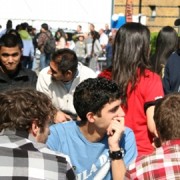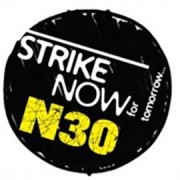 With public opinion of journalists at its nadir following the News of the World phone hacking saga, the era of honest hard-hitting journalism seems to be over.
With public opinion of journalists at its nadir following the News of the World phone hacking saga, the era of honest hard-hitting journalism seems to be over.
That may be the case for the United Kingdom, but across the globe, journalists are still challenging their governments, campaigning for human rights and risking their careers and their lives for their professions.
On the Record is a new play being staged next week at the Arcola Theatre, in Dalston which recounts the real-life stories of journalists in Mexico, Sri Lanka, Russia, Israel and Iraq, as they attempt to challenge the official version of the truth in their countries.
The play’s artistic director and co-author, Christine Bacon, used testimonies from journalists compiled with phone interviews, Skype meetings and face-to-face meetings, to construct this piece of verbatim theatre.
“It’s about real people, real journalists. It took about six to seven months to interview all the journalists, asking them how they felt about their profession and their experience. For the Russian character, Elena Kostyuchenko, she worked for an independent paper in Russia so we rang them up and asked to interview her. We did a follow-up interview and read her articles to get a real sense of her work,” she said.
Kostyuchenko worked for the paper Novaya Gazeta, a paper uncovering corruption and human rights abuses under President Vladimir Putin’s power. She joined the paper aged 21 and was inspired by the work of ones of its most famous journalists, Anna Politkovskaya, who was shot dead in October 2006. Politkovskaya’s image has joined an ever-expanding photo-gallery of dead colleagues in the paper’s office.
The play also follows Amira Hass, an Israeli journalist working for the newspaper Ha’aretz, who has criticised Israeli government policy towards the Palestinians.
“I was aware of her single-mindedness in monitoring the occupation of the Palestinian territories. She was very outspoken and precise and had a unique way of doing work over the past 20 years,” said Bacon.
One of the most controversial figures in the play is the photojournalist Zoriah Miller, whose work took on the Western powers over the invasion of Iraq.
“I read about Miller in the Index on Censorship magazine. There was a lot of controversy over his photos of dead Marines, and the American authorities tried to censor him, but he published them.”
The journalists depicted in the play pursue truth despite threats to their lives. The play shows an example of this through the testimony of Lasantha Wickrematunga, a Sri Lankan Singhalese journalist who, along with his brother Lal, start a newspaper to publish stories that other papers are too frightened to write about.
Bacon met Wickrematunga at an awards ceremony in London. He was an out-spoken critic of the regime run by the Sri Lankan President Mahinda Rajapakse, accusing them of repression and corruption. In January 2009, a few days after he penned a chilling editorial predicting his death, his fears were realised as he was gunned down when driving to work, a stark reminder of the horrifying sacrifices journalists make. According to Reporters Without Borders, 30 journalists have already been killed this year around the world, and 145 journalists are currently in prison.
Bacon thinks that the play is a timely reminder of the positive force of journalism.
“Journalism has a crucial function today. Mainstream journalism has become an entertainment industry and this play is about celebrating what these people do. They don’t just accept things, they question it and question power.”
On the Record joins an expanding list of productions using verbatim theatre; where the play is constructed from the exact words taken from interviews in order to explore human rights or current affairs issues. In 1999, the Colour of Justice, a dramatisation of the Stephen Lawrence inquiry revealed the police’s incomptentcy and own prejudices when dealing with the investigation. Another, Deepcut in 2009 explored a family’s journey as they tried to find out why their 18-year-old daughter, a new recruit at Deepcut military Barracks, died of gunshot wounds.
Most recently, Tactical Questioning at the Tricycle Theatre received critical acclaim for its depiction of a public inquiry into the death of Iraqi Baha Mousa who was arrested by the British army in 2003, as a suspected insurgent. He was found dead two days later, with at least 93 injuries to his body.
Bacon has seen a rise in verbatim theatre productions over the past few years. “It’s seen as the strange cousin of mainstream theatre, but it has become more accepted recently. It really took off after 2001, when the war on terror started and then the invasion of Iraq and the government was telling us lies. People wanted to know the truth behind the official line.”
Although not all verbatim theatre is political, it has often been used in productions to highlight human rights issues. “Verbatim theatre is often represented as being rather worthy, as an opportunity for playwrights to push their own agenda. But it’s such an important tool in that it creates the experience of empathy, empathy with characters that draws you into the lives of people, and it’s one of the many ways to touch people and make them think differently,” Bacon said.
On July 21 the Sri Lanka Campaign for Peace and Justice will be holding a benefit night, which will include the play and a video from the wife of Wickramatunga.
Fred Carver, director of the Sri Lanka Campaign for Peace and Justice said that the play is a valuable means of revealing the way the way in which the media is suppressed in Sri Lanka.
“The impunity with which the government of Sri Lanka allows those who would speak out to be killed means that you have to be a very brave person indeed to tell the truth in Sri Lanka. The play’s hero, Lasantha Wickermatunga, was one of the bravest of all. It is hardly surprising that so few are willing to follow in his footsteps.
“But the murder of journalists is only the tip of a very sinister iceberg of media intimidation. When I was in Sri Lanka I met many people who told me of the constant intimidation and harassment you face if you speak out: midnight phone calls, intimidating visits by the army to the houses of your elderly relatives, and threats to your children. Little wonder that the Sri Lankan media is utterly hobbled by self-censorship.”
The Campaign hopes the play will inspire people to lobby for an end to human rights abuses in the country, and urge the UN to undertake a war crimes enquiry following the explosive documentary Sri Lanka’s Killing Fields, which was broadcasted last month on Channel 4 depicting the war crimes committed by Sri Lankan government forces in 2009.
On the Record runs from July 20 to August 13
The Sri Lanka benefit night includes a post-show discussion and drinks reception. Tickets cost £25, £15 for students. Click here for tickets
On other nights tickets cost £17 and £11 for students.
Tuesdays : Pay what you can




